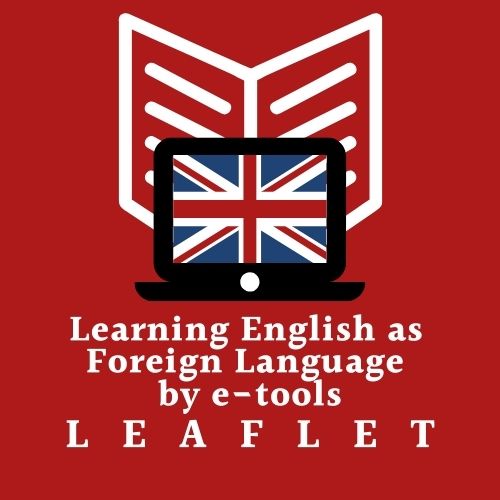“Learning English as foreign language by e-tools
“Learning English as foreign language by e-tools” (LEaFLEt) Erasmus+ strategic partnership project is promoted by Fundacja Creator from Poland. Partners of this strategic partnership came from Poland, Italy, Spain, Estonia and Bulgaria and most of them have already gained experience in the adult educational field and in several Erasmus+ projects.
The project aim is to strengthen the skills and competencies of adult teachers, trainers and providers who work in different adult learning contexts, adult schools, senior clubs, and in Third Age Universities with people aged 50+, minorities groups, unemployed adults, students and retired people.
Life in a digital era requires that new methodologies and approaches must be used in the teaching field. In this regard, teaching English as a foreign language for seniors and adult learners makes necessary to upgrade adult teachers’ digital competencies to better use e-tools during their lessons. Indeed, many EFL (English as Foreign Language) adult teachers are interested in experimenting new methodologies suited for teaching to adults in their classes.
One of the most useful techniques to attract adult and senior students to learn foreign languages is Digital Storytelling (DST) method. Adult students enjoy listening to the stories since the narration has the power to stimulate curiosity and imagination.
Therefore, since adult and seniors people choose to learn a language for different needs out of the schemes, digital storytelling combined with other e-tools could be a very useful tool to teach/learn foreign languages in adult classrooms in all educational contexts.
Thanks to the use of digital stories in English classroom partners aim to:
• Motivate and encourage active participation of adult students’ groups in learning English process.
• Encourage the use of imagination and creativity.
• Encourage the cooperative learning among students.
Partnership specific objectives are:
- To improve English teachers’ digital competencies.
- To develop students’ languages skills.
- To develop a teaching methodology using e-tools such as digital storytelling.
- To expand the lexicon using different words that come out of the story building process.
- To improve the understanding and pronunciation using videos and audios as part of digital story play.
- To create a stimulating and fun learning environment using fascinating and meaningful stories.
- To promote the DST as learning tool to promote and develop an intercultural language education not taking into account the context and the language level
During the planned short-term joint staff training event, participants will have the chance to achieve the project objectives in learning e-tools which are useful to motivate and update adult students in the English learning process.
Partnership aims also to produce the following tangible learning outcomes:
- Didactic materials for training course.
- LEaFLET dedicated Facebook page and social media resources.
- LEaFLET virtual toolkit for adult English teachers.
- Video stories made by adult groups of learners in each partner country.
- LEaFLET Vademecum (brief guide-line handbook) for English teachers.
According to the target group identified by each partner, the different levels of impact are expected in this project on the following participants: English teachers, partner organizations’ staff, adult and senior students, adult educational organizations in partners’ countries and around Europe.
In a long-term perspective, through the creation of a new European network among partners’ organisations we will guarantee the evolving of our work after the cycle-life of the project promoting Erasmus+ programs among all European citizens that can benefit from our project. Seniors and adult learners lead by English languages’ teachers can improve their English using e-tools.
Facebook page: https://www.facebook.com/Learning-English-as-Foreign-Language-by-e-tools-103636758388266
This project has been founded with support from the European Commission. This publication reflects the views only of the author and the Commission cannot be held responsible for any use which may be made of the information contained therein.


